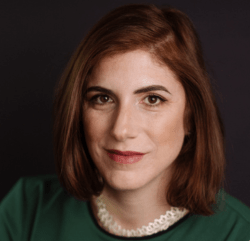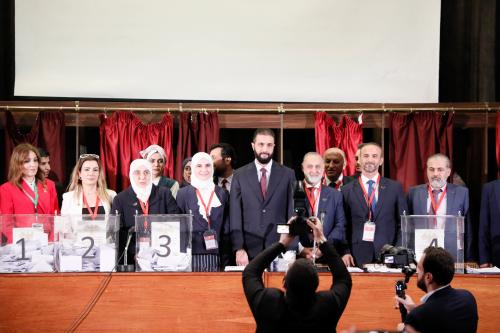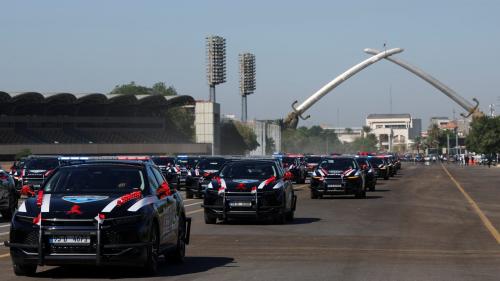Syrian President Ahmad al-Sharaa’s White House visit earlier this week was another one of President Donald Trump’s perfectly made-for-television moments. The former al-Qaida fighter entered the White House from a side door—and left with a promise for one more push to lift the layers and layers of U.S. sanctions on Syria. Inside the Oval Office, Trump asked how many wives he had and gave Syria’s interim president his own brand of perfume. Following the visit, an announcement came about Syria entering the U.S.-led coalition against the Islamic State (ISIS), with unconfirmed reports of plans for a U.S. military presence in Damascus.
Bringing Syria back into the international community after half a century of Assad dictatorship and a devastating civil war is, itself, a worthy goal—and Trump deserves credit for attempting it. Trump’s regional envoy, Tom Barrack, has built close ties with the new government in Damascus and is keen to make a security partner out of former jihadists. Al-Sharaa has shown remarkable pragmatism since his forces toppled Bashar al-Assad and could well emerge as a new American ally.
But Syria’s monumental internal and external challenges demand a steadier and intensified U.S. engagement than the president’s “victory-first, details-later” style allows. Trump’s notion of regional peace through large-scale reconstruction projects has, unsurprisingly, a certain appeal to the elites and autocracies of the Middle East—some of whom might step in to help Syria. But rehabilitating a country so politically, economically, and socially fractured cannot be achieved through optics—or construction—alone. While Syria’s economic recovery is vital, genuine stability requires U.S. commitment to governance aid, transitional justice, and institution-building.
The truth is, Syria’s post-Assad transition remains fragile: governance is weak, institutions are hollow, and millions remain displaced. Relations between Damascus and Syria’s Kurdish and Druze minorities remain undefined, with no legal framework to govern regional autonomy, resource sharing, or representation—leaving key questions of power unsettled. Without serious U.S. and European support for governance, institution-building, and economic reform, Syria risks sliding back into chaos.
The governance question
Al-Sharaa has shown pragmatism abroad—balancing ties with the Gulf, the United States, Turkey, and Israel—but he is struggling to build an inclusive political system at home. There has been no framework agreement for political representation or participation, and while it might be too early to expect a new constitution, the issue of minority representation is an urgent one. For a country as diverse as Syria, some form of decentralization will be essential to ensure representation for Kurds, Druze, Christians, and Alawites, while maintaining national unity. The procedural and substantive foundations for the future governance structure matter today, in other words.
Syria’s interim government signed an agreement with the U.S.-backed Syrian Kurds in March to integrate the Syrian Democratic Forces (SDF) into the national military, but negotiations have been slow. Beyond how to militarily integrate the 100,000-strong Kurdish-led forces, there are questions of resource-sharing and local governance. Kurds have agreed in principle to join the Syrian army and hand over border crossings and natural resources—but fear losing their sole leverage if there isn’t an agreement on local autonomy. Without an endgame in sight—a new constitution or legal document that codifies regional powers—neither side is likely to compromise.
Meanwhile, Israel supports greater autonomy for the Druze after sectarian clashes in southern Syria over the summer—but the temporary deal with the Druze is not connected to the ongoing negotiations with Kurds. In other words, Damascus is dealing with the Druze issue as part of its security framework with Israel and separate from its dealings with Kurds. These tensions on both fronts underscore the urgent need for a new governance framework that reflects Syria’s complex social and military reality—but the new regime’s capacity for a comprehensive legal reform process is limited.
Security sector reform should also be a top priority. Militia groups like the SDF must be reintegrated into national security institutions in ways that minimize future fighting and prevent tension with foreign fighters and Salafist groups, which are now embedded into Syria’s defense ministry. Without systemic and wholesale reform, Hayat Tahrir al-Sham-aligned factions—some of which fought alongside al-Sharaa to overthrow Assad—or the Kurdish forces could undermine the transition from within. Integrating these forces into a professional command structure is vital to preventing another collapse of state authority.
Washington largely views its leverage in Syria through its ability to lift or impose sanctions—but not through other levers that could enable governance reform or capacity building. Trump’s instinct to loosen restrictions that block legitimate investment is understandable—yes, Syrians deserve a chance to rebuild their country and leave behind the darkness of the past—but further U.S. assistance should be used strategically as a bargaining chip to promote transparency, reform, and inclusive governance.
Counterterrorism and deradicalization
Syria’s governance challenges are directly tied to its security landscape. The United States is eager for Syria to join the global coalition against ISIS and is reportedly planning on having a permanent military presence in Damascus to coordinate Syrian-Israeli relations. But Syria’s security needs go beyond managing relations with Israel. Washington should help the al-Sharaa government develop a deradicalization plan for the thousands of ISIS-linked detainees and families still in prisons and camps—and encourage a humane, transparent policy distinguishing who will be prosecuted, rehabilitated, or reintegrated. Sending everyone home will not address the social and political challenges from radicalism.
The Israel question
The Trump administration is reportedly pushing for Syria’s inclusion in the Abraham Accords. Achieving Israeli-Syrian peace would be historic, but it is premature. Israeli forces still occupy parts of southern Syria and regularly target Hezbollah and Iranian-linked assets inside Syria. Israel also views itself as a protector of Syria’s Druze population, intervening militarily as recently as this summer. While Washington supports Syria’s territorial integrity and unity, it has been unable to deter Israeli military operations. Given the complexity of U.S. relations with Israel on Gaza and Iran, Washington is unlikely to do so in the future. Instead of rushing toward a grand bargain, Washington should encourage smaller, pragmatic steps—such as deconfliction mechanisms, trade links, and border coordination—that could lay the groundwork for eventual peace.
Reconstruction and the U.S. path forward
Syria’s humanitarian crisis remains immense. Cities like Aleppo, Homs, and Raqqa are still in ruins, and rural economies have collapsed. Washington must work with the United Nations and aid agencies to ensure that aid and reconstruction reach all communities—Sunni, Kurdish, Alawite, and Christian alike. Yet Trump’s sweeping cuts to foreign assistance have weakened the United States’ ability to influence events on the ground. Without sustained U.S. engagement, the burden will fall to regional powers with narrower interests—whose agendas do not involve accountability, representation, transitional justice, and individual rights and freedoms.
Inviting al-Sharaa—once labeled a terrorist—to the White House is a bold gamble. But turning this moment into real progress will require more than photo ops. It demands sustained diplomacy, capacity building, sanctions relief, and long-term support for inclusive governance—all the boring work that the U.S. agencies Trump has shut down had excelled in.
If Trump truly wants to make Syria a “success story,” he must move beyond slogans and commit the U.S. government to a transformative agenda inside Syria—with all the less glamorous but critically important work that it entails. Until then, the mission in Syria is far from accomplished.
-
Acknowledgements and disclosures
The authors would like to thank an anonymous peer reviewer and our diligent editor, Adam Lammon, for their feedback on this article.
The Brookings Institution is committed to quality, independence, and impact.
We are supported by a diverse array of funders. In line with our values and policies, each Brookings publication represents the sole views of its author(s).




![Photo showing "I [heart] Syria" sign along the road in Syria](https://www.brookings.edu/wp-content/uploads/2025/11/I-heart-syria-photo.jpg?quality=75&w=500)




Commentary
On Syria, Trump is far from ‘mission accomplished’
November 14, 2025